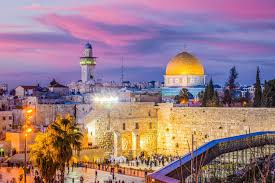Jerusalem is one of the oldest and most significant cities in the world. Located in the heart of Israel, it holds deep religious, historical, and cultural importance for billions of people. Revered by Jews, Christians, and Muslims alike, Jerusalem is often called the "Holy City" and has been a center of spirituality, conflict, and coexistence for thousands of years.
A City Sacred to Three Religions
Jerusalem is unique in being a sacred city to the three major monotheistic religions:
-
For Jews, it is the site of the ancient Temple, the holiest place in Judaism. The Western Wall, a remnant of the Second Temple, remains a place of prayer and pilgrimage.
-
For Christians, Jerusalem is where Jesus was crucified, buried, and resurrected. The Church of the Holy Sepulchre, one of the most important sites in Christianity, draws pilgrims from around the world.
-
For Muslims, it is home to the Al-Aqsa Mosque and the Dome of the Rock on the Haram al-Sharif (Temple Mount), making it the third holiest city in Islam after Mecca and Medina.
A Living Museum of History
Jerusalem's history spans over 3,000 years. From biblical times through Roman rule, Crusader battles, Ottoman governance, and the modern era, the city has seen the rise and fall of empires. The Old City, surrounded by ancient walls, is divided into four quarters — Jewish, Christian, Muslim, and Armenian — each with its own rich traditions, architecture, and culture.
Walking through the Old City is like stepping back in time. Cobblestone streets lead to sacred sites, vibrant markets, and centuries-old homes. Every stone tells a story, and every corner reveals a new layer of history.
Modern Jerusalem
While Jerusalem is rooted in ancient history, it is also a modern capital. It is the official capital of Israel and the seat of its government institutions, including the Knesset (parliament), Supreme Court, and many national museums and universities.
Jerusalem is a city of contrasts — ancient and modern, sacred and secular, quiet prayer and bustling life. Neighborhoods like West Jerusalem offer modern cafes, shopping centers, and cultural institutions, while East Jerusalem is known for its Arab culture, traditional markets, and historic landmarks.
Cultural and Spiritual Diversity
Jerusalem is home to a diverse population, including Jews, Arabs, Christians, Muslims, and many other groups. Despite its deep religious divisions and political tensions, the city remains a symbol of spiritual strength and resilience.
Festivals and religious holidays are deeply felt in the city. Whether it’s the lighting of Hanukkah candles, Christian Easter processions, or the call to prayer during Ramadan, Jerusalem lives and breathes its faith.
Jerusalem is not just a city — it is a symbol of belief, history, and hope. Its stones have witnessed the prayers of prophets, the footsteps of kings, and the dreams of millions. While it has faced conflict and challenges, Jerusalem continues to inspire people from all over the world. A visit to this timeless city is a journey into the soul of humanity, where the past, present, and future meet.
